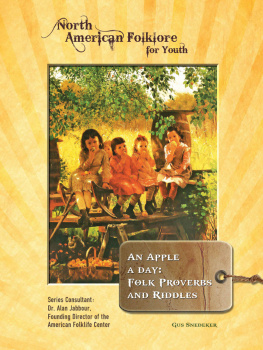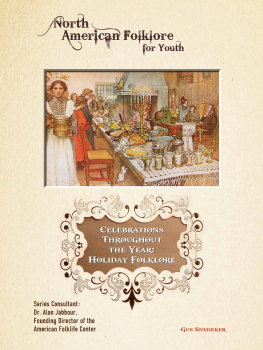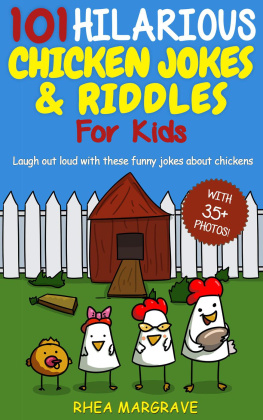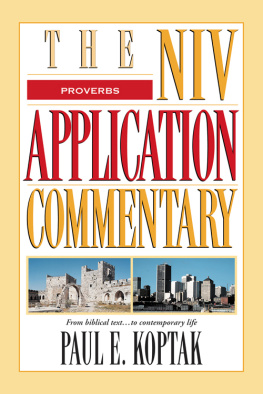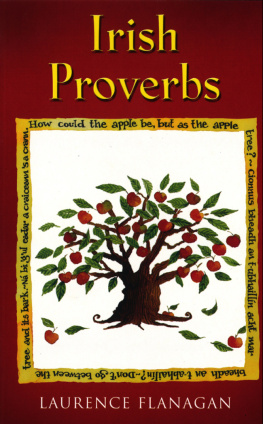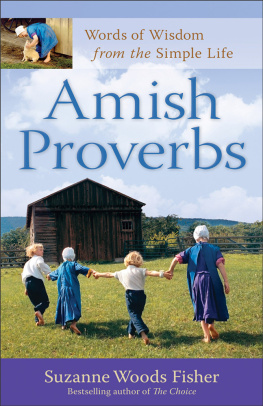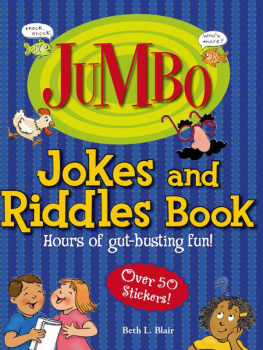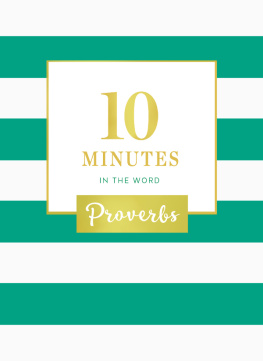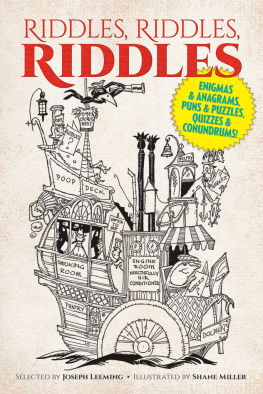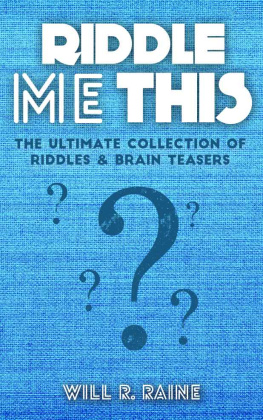An Apple a Day
Folk Proverbs and Riddles
North American Folklore for Youth
An Apple a Day: Folk Proverbs and Riddles
And to All a Good Night: Christmas Folklore
Black Cats and White Wedding Dresses: Folk Customs
Campfire Songs, Ballads, and Lullabies: Folk Music
Celebrations Throughout the Year: Holiday Folklore
Heroes, Fools, and Ghosts: Folk Tales and Legends
Quilts, Rag Dolls, and Rocking Chairs: Folk Arts and Crafts
Sirens and Smoke: Firefighters Folklore
Tell Me a Story: Family Folklore
Youre It! Tag, Red Rover, and Other Folk Games
An Apple a Day
Folk Proverbs and Riddles
Gus Snedeker
Mason Crest

| Mason Crest 370 Reed Road Broomall, Pennsylvania 19008 www.masoncrest.com |
Copyright 2013 by Mason Crest, an imprint of National Highlights, Inc. All rights reserved. No part of this publication may be reproduced or transmitted in any form or by any means, electronic or mechanical, including photocopying, recording, taping, or any information storage and retrieval system, without permission from the publisher.
Printed and bound in the United States of America.
First printing
987654321
Library of Congress Cataloging-in-Publication Data
Snedeker, Gus.
An apple a day : folk proverbs and riddles / Gus Snedeker.
p. cm.
ISBN 978-1-4222-2493-9 (hardcover) ISBN 978-1-4222-2486-1 (hardcover series) ISBN 978-1-4222-9258-7 (ebook)
1. Riddles, Juvenile. 2. ProverbsJuvenile literature. I. Title.
PN6371.5.S64 2012
398.9dc23
2012011852
Produced by Harding House Publishing Services, Inc.
www.hardinghousepages.com
Cover design by Torque Advertising + Design.
Contents
W hat do a story, a joke, a fiddle tune, a quilt, a dance, a game of jacks, a holiday celebration, and a Halloween costume have in common? Not much, at first glance. But theyre all part of the stuff we call folklore.
The word folklore means the ways of thinking and acting that are learned and passed along by ordinary people. Folklore goes from grandparents to parents to childrenand on to their children. It may be passed along in words, like the urban legend we hear from friends who promise us that it really happened to someone they know. Or it may be tunes or dance steps we pick up on the block where we live. It could be the quilt our aunt made. Much of the time we learn folklore without even knowing where or how we learned it.
Folklore is not something thats far away or long ago. Its something we use and enjoy every day! It is often ordinaryand yet at the same time, it makes life seem very special. Folklore is the culture we share with others in our homes, our neighborhoods, and our places of worship. It helps tell us who we are.
Our first sense of who we are comes from our families. Family folklorelike eating certain meals together or prayers or songsgives us a sense of belonging. But as we grow older we learn to belong to other groups as well. Maybe your family is Irish. Or maybe you live in a Hispanic neighborhood in New York City. Or you might live in the country in the middle of Iowa. Maybe youre a Catholicor a Muslimor youre Jewish. Each one of these groups to which you belong will have its own folklore. A certain dance step may be African American. A story may have come from Germany. A hymn may be Protestant. A recipe may have been handed down by your Italian grandmother. All this folklore helps the people who belong to a certain group feel connected to each other.
Folklore can make each group special, different from all the others. But at the same time folklore is one of the best ways we can get to know to each other. We can learn about Vietnamese immigrants by eating Vietnamese foods. We can understand newcomers from Somalia by enjoying their music and dance. Stories, songs, and artwork move from group to group. And everyone is the richer!
Folklore isnt something you usually learn in school. Somebody, somewhere, taught you that jump-rope rhyme you knowbut you probably cant remember who taught you. You definitely didnt learn it in a schoolbook, though! You can study folklore and learn about itthats what you are doing now in this book!but folklore normally is something that just gets passed along from person to person.
This series of books explores the many kinds folklore you can find across the North American continent. As you read, youll learn something about yourselfand youll learn about your neighbors as well!

J anie could not wait for her big brother to get home. He was coming home from college for the summer. He had called the night before to say he would get home around 2:00 in the afternoon. It was 9:00 in the morning now and Janie was already staring out the front window, waiting. Her dad came up and said, I know you are very excited to see Chris again, but remember, a watched pot never boils!
Janie turned and looked at her dad. What does that mean, Dad?
Chris will be here at 2:00 no matter what you do. If you sit here the whole time, it will seem like he takes forever to get home. If you go outside and play with your friends, he will be here before you know it. Time flies when you are having fun!
Janie was not sure exactly what her dad meant. She did go to play with her friends.
In the middle of a game of tag just a little while later, her mom called out, Your brother is home! Janie was amazed. Her dad was right. The time had gone by so fast. She ran in to greet her brother.
What Is a Proverb?
Proverbs and riddles are part of the oral tradition of America. Oral tradition is history that is only spoken. It is not written down. Oral tradition is told from person to person in stories, poems, songsand proverbs and riddles. A cultures oral tradition is an important way that knowledge is passed down through generations.
A watched pot never boils.
Time flies when you are having fun.
Janies dad uses these two common proverbs. What is a proverb? They are short phrases that tell a belief or a bit of wisdom. Proverbs give a lot of meaning in just a few words. These phrases are told from person to person through generations. They do not change much over time. A lot of the proverbs you hear today are most likely the same ones your great-grandparents heard when they were kids.
DID YOU KNOW?
Proverbs are found in every language and culture.

Proverbs and riddles are passed down through families, taught to children by their parents.
Proverbs can be either metaphorical or literal. A metaphorical proverb uses words that mean one thing to say something else. A literal proverb means exactly what it says. Heres an example:
Dont put all your eggs in one basket.
What does this mean? It could mean exactly what it says. Eggs can break. A lot of eggs in one basket could all break at once. You would be smart to put your eggs in a few baskets. That way if you dropped one basket you would still have other baskets with eggs in them. That is the literal meaning.
But the proverb is not really talking about eggs and baskets. The eggs stand for something else, like money. The baskets stand for risk. For example you might spend all your allowance on one big toy or on five small toys. The one big toy might break, leaving you with nothing. If one little toy breaks, you still have four toys left. You did not put all your eggs (allowance) into one basket (toy). This is the metaphorical meaning of the proverb.
Next page
